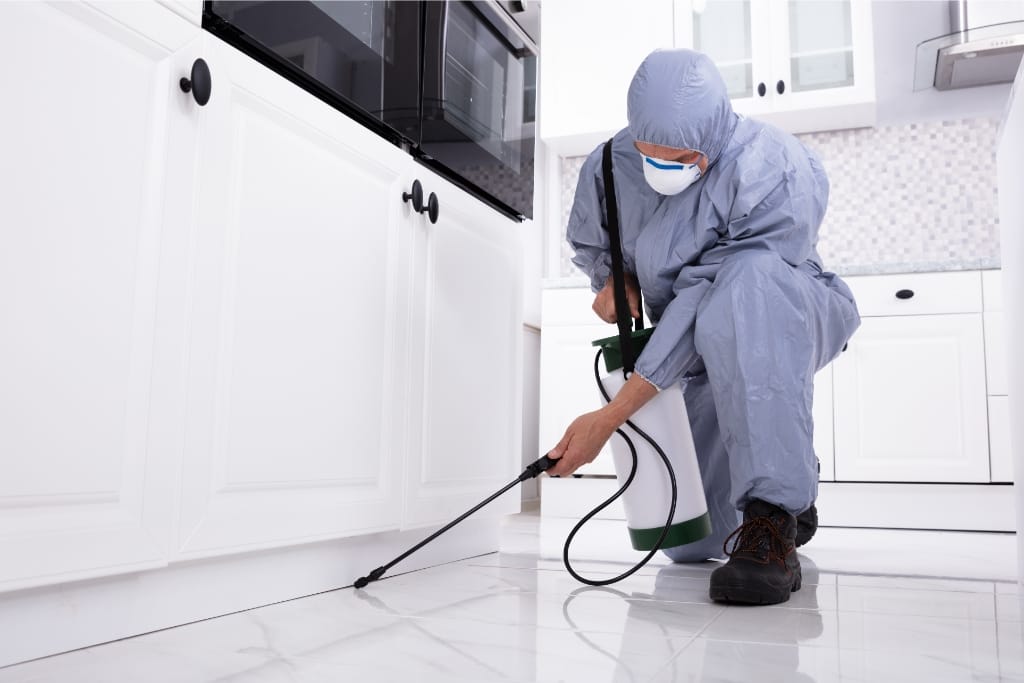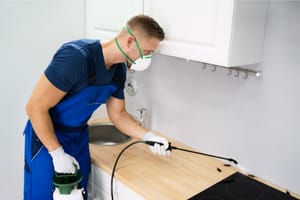Battling a pest infestation is not just a nuisance; it's a cry for help from your living spaces.
Whether it's the silent scurry of ants, the ominous presence of cockroaches, the stealthy damage caused by rodents, or any other unwelcome visitors, selecting the right pest control company is pivotal in reclaiming your peace and cleanliness.
Amidst a sea of pest control providers, pinpointing the one that best suits your situation can seem daunting.
This article is dedicated to unveiling 10 insightful tips that will guide you through the maze of options to the pest control company that will turn your pest puzzle into a thing of the past.
1)) Research And Read Reviews
Before hiring a pest control company, take the time to research different companies in your area.
Look for reviews and testimonials from previous customers to get an idea of their reputation and level of service. Websites like Yelp, Google Reviews, and Angie's
A list can provide valuable insights into the experiences of others with a particular company.
Tips for Effective Research and Review Reading:
- Start with a Broad Search: Begin your research by searching for pest control services in your area on search engines and social media platforms to get a broad sense of your options.
- Check Multiple Review Sites: Don't rely on reviews from a single source. Check various websites such as Google Reviews, Yelp, and Better Business Bureau to get a balanced view of each company's reputation.
- Look for Consistency: Pay attention to both positive and negative reviews, especially if certain types of complaints or praises are consistent across multiple reviews. This can signify persistent issues or strengths.
- Consider the Context: When reading reviews, try to understand the context. For instance, a negative review related to a rare, unforeseeable problem may not accurately represent the company's overall service quality.
- Direct Communication: After narrowing down your choices, consider reaching out to the companies directly with any specific questions or concerns. This can give you a sense of their customer service and willingness to engage with potential clients.
Taking the time to thoroughly research and read reviews is a critical first step in finding a reputable pest control company.
By employing a strategic approach to review analysis, including looking at various sources and engaging in direct communication when necessary, you can gain a comprehensive understanding of each company's strengths and weaknesses.
This method not only helps in making an informed decision but also sets the stage for a satisfactory solution to your pest concerns.
2)) Check For Licenses And Certifications
It's important to ensure that the pest control company you choose is properly licensed and certified to perform pest control services in your state.
This not only ensures that they have met the necessary requirements but also indicates their commitment to professionalism and quality service.
Tips for Verifying Licenses and Certifications:
- Request Proof of Licensing: Don’t hesitate to ask a pest control company for proof of their licensing. A reputable company will readily provide documentation proving they are authorized to offer pest control services in your area.
- Verify With Local Authorities: Take the initiative to verify the company’s licensing status with your local or state pest control authorities. This ensures the information provided by the company is accurate and up-to-date.
- Check for Industry Certifications: Look for companies that have professional certifications from recognized industry organizations, such as the National Pest Management Association (NPMA). These certifications are a testament to the company’s knowledge and adherence to industry standards.
- Inquire About Continuous Education: Ask if the company’s technicians undergo continuous education or training. This is crucial for keeping up with the latest pest control methods and safety protocols, ensuring you receive effective and safe services.
In essence, verifying a pest control company's licenses and certifications is an essential step in ensuring that you're hiring a legitimate and qualified provider.
This process not only confirms their legal compliance but also reflects their commitment to professional development and adherence to industry standards.
By taking these steps, you can trust in the quality and safety of the services you're securing to protect your home from unwanted pests.
3)) Ask About Experience And Expertise
When speaking with potential pest control companies, inquire about their experience dealing with specific types of pests that are causing issues in your home.
A company that specializes in treating a particular type of pest may be more equipped to handle your situation effectively.
Tips for Assessing Experience and Expertise:
- Inquire About Years in Business: Ask how long the company has been in operation. A long-standing presence in the industry often indicates a wealth of experience and a proven track record of success.
- Request Pest-Specific Experience Details: If you're dealing with a specific pest, ask about the company’s experience in dealing with it. Companies with specialized experience are likely to offer more effective solutions.
- Ask for References or Case Studies: Request references or case studies from past clients, especially those with similar pest issues. This can provide insights into the company's ability to effectively address your particular problem.
- Evaluate the Company’s Knowledge: During your interaction, assess the company’s knowledge by asking questions about your pest situation. A knowledgeable provider will offer detailed explanations and effective treatment strategies.
- Consider the Use of Innovative Techniques: Find out if the company uses the latest and most effective pest control techniques. Innovation in pest management can indicate a company's commitment to providing the best possible service.
Asking about a pest control company's experience and expertise provides invaluable insight into their ability to solve your specific pest problems.
By inquiring about their years in business, specific experiences with your type of pest, and looking for evidence of their knowledge and use of innovative techniques, you can select a provider with confidence.
This careful vetting process ensures that the company you choose has not only the experience but also the expertise to effectively and efficiently resolve your pest issues.
4)) Request A Written Estimate
Before agreeing to any services, ask for a written estimate detailing the cost of treatment, any guarantees or warranties provided, and the scope of work to be performed.
This will help you compare pricing between different companies and avoid any surprises when it comes time to pay.
Tips for Requesting a Written Estimate:
- Ask for a Comprehensive Breakdown: Ensure the estimate includes a detailed breakdown of costs, including labor, materials, and any additional charges. This transparency helps in understanding exactly what you're paying for.
- Seek Clarification on Guarantees or Warranties: Request information on any guarantees or warranties that accompany the service. Knowing what is covered and for how long can provide peace of mind post-treatment.
- Compare Estimates: Don't hesitate to obtain estimates from multiple companies. This comparison can help you find the best value and ensure that the rates are competitive for the quality of service offered.
- Ensure All Promises Are Documented: If specific promises are made during the consultation, such as targets for eradication timelines or follow-up visits, make sure these are included in the written estimate. This documentation solidifies the company's commitment to fulfilling its promises.
Requesting a written estimate before engaging a pest control service is not just about obtaining a potential cost; it's a critical step in ensuring transparency, accountability, and understanding between you and the service provider.
It allows you to compare services on a like-for-like basis, ensures that there are no hidden costs and that the scope of work is clearly defined.
This preparatory step can save you from unexpected expenses and helps in solidifying a mutual agreement on the expected outcomes of the pest control efforts.
5)) Inquire About Treatment Methods
Different pest control companies may use varying treatment methods depending on the type of pests being targeted and your preferences as a homeowner.
Make sure to ask about the products they use, how they are applied, and any potential risks associated with them.
Tips for Inquiring About Treatment Methods:
- Ask About the Chemicals Used: It's important to know what chemicals will be used in your home. Ask for the names of these products and research their safety and environmental impact.
- Inquire About Non-Chemical Options: Find out if there are non-chemical treatment methods available that might be safer for your family and pets.
- Understand the Application Process: Understand how and where the treatments will be applied in your home to prepare any necessary accommodations.
- Discuss Potential Risks: Ask about any potential risks associated with the treatment methods and what precautions should be taken before, during, and after application.
- Question the Duration of Effectiveness: Find out how long the treatment is expected to last and what factors might affect its efficacy.
Inquiring about treatment methods is crucial in ensuring the safety and efficacy of pest control measures.
By asking detailed questions about the chemicals used, exploring non-chemical alternatives, understanding the application process, discussing potential risks, and inquiring about the duration of effectiveness, you equip yourself with the knowledge needed to make informed decisions.
This careful consideration not only protects your home and health but also contributes to the successful resolution of pest issues with minimal environmental impact.
6)) Check For Insurance Coverage
Accidents can happen during pest control treatments, so it's essential to verify that the company has insurance coverage for both liability and worker's compensation.
This protects you as a homeowner in case of any damage or injuries that occur on your property during service.
Tips for Checking Insurance Coverage:
- Verify Liability Insurance: Ensure that the pest control company has liability insurance to cover any potential damages to your property during treatment.
- Ask for Proof of Worker’s Compensation: Request to see proof of worker’s compensation insurance to protect against any claims if a technician gets injured while on your property.
- Understand What’s Covered: Clarify exactly what the insurance covers and if there are any limitations or exclusions that might affect you.
- Check the Validity: Make sure the insurance is current and not near expiration. It’s a good practice to check that the coverage will be valid throughout the duration of your pest control treatment.
- Request Documentation: Ask for copies of the insurance certificates for your records. This provides a level of transparency and trust between you and the pest control service.
Ensuring that a pest control company is adequately insured is a critical aspect of the hiring process.
It provides a safety net, shielding you from the financial and legal ramifications of unforeseen incidents that could occur during the treatment.
By verifying liability and worker's compensation insurance, you protect your property and yourself against potential damages and injuries.
This due diligence not only underscores the professionalism of the service provider but also fosters a foundation of trust and security, paving the way for a worry-free pest control experience.
7)) Get Referrals From Friends Or Family
Word-of-mouth recommendations can be invaluable when searching for a reliable pest control company.
Ask friends or family members who have dealt with similar issues if they have any recommendations or warnings about specific companies they have used in the past.
Tips for Getting Referrals From Friends or Family:
- Be Specific About Your Needs: When asking for referrals, be clear about the type of pest problem you're facing, so you get recommendations that are relevant to your situation.
- Ask About Their Experience: Find out not just who they recommend, but why. Ask about the effectiveness of the treatment, the professionalism of the staff, and their overall satisfaction with the service.
- Inquire About Customer Service: Learn about the company's approach to customer service through the experiences of your friends or family. Were they punctual, polite, and informative?
- Seek Details on Follow-Up: An effective pest control process often involves follow-ups. Ask if the company provided a plan for ongoing prevention or treatment.
- Gather Multiple Referrals: Try to get referrals from several sources to have options to compare. This will give you a broader perspective on the available services and their reputations.
- Consider the Cons: If any friends or family members had negative experiences with a pest control service, make sure to get the details. This could help you avoid making a similar mistake.
Leveraging referrals from friends and family is a strategic approach to finding a trustworthy pest control service.
It offers firsthand insights into the effectiveness and quality of the service provided, enhancing your confidence in making an informed decision.
Listening to personal experiences helps identify reputable companies and steer clear of potential pitfalls, guiding you toward a solution that is tried, tested, and trusted within your own community.
This method not only narrows down your options but also enriches your decision-making process with personal testimonials that you can rely on.
8)) Look For Green Pest Control Options
If you are concerned about using harsh chemicals in your home or have pets or children present, consider looking for pest control companies that offer environmentally friendly or "green" treatment options.
These methods are designed to be safe for people and pets while still effectively eliminating pests.
Tips for Looking For Green Pest Control Options:
- Research Environmentally-Friendly Methods: Start by familiarizing yourself with what constitutes green pest control practices. Look for companies that utilize non-toxic, natural, or organic solutions.
- Check Certifications: Some pest control companies may have certifications from environmental organizations. Verify these certifications to ensure their commitment to eco-friendly practices.
- Ask About Their Approach: During your inquiry, question the company about their specific green pest control methods. Understand what products they use and how they ensure these are safe for your home, family, and the environment.
- Inquire About Integrated Pest Management (IPM): IPM focuses on the long-term prevention of pests or their damage through a combination of techniques such as biological control, habitat manipulation, and the use of resistant varieties. This method minimizes the use of chemicals.
- Request for Product Labels: Ask for labels of the products they use to check for any harmful ingredients. Responsible companies should be transparent about the substances they apply in your home.
- Consider the Effectiveness: Ensure that the green methods being offered are effective for your specific pest issue. Sometimes, a combination of traditional and green methods may be required.
- Evaluate the Cost: Understand how the pricing for green pest control compares to traditional methods. While eco-friendly options may sometimes be more expensive, evaluate the benefits of a safer approach for your home environment.
Opting for green pest control options represents a conscious decision to protect your home and the environment while still effectively managing pest issues.
This approach underscores the importance of safety, sustainability, and responsibility towards your family and the planet.
By prioritizing eco-friendly practices, you not only contribute to the reduction of harmful chemicals in your living spaces but also support pest control methods that align with a greener future.
Making an informed choice for green options is a step towards fostering a healthier home and a more sustainable world.
9)) Inquire About Follow-Up Services
Some pests may require multiple treatments or ongoing maintenance to completely eradicate them from your home.
Be sure to ask about follow-up services offered by the company after the initial treatment is completed to ensure that pests do not return.
Tips for Inquiring About Follow-Up Services:
- Clarify the Scope of Follow-Up Services: Ask the pest control company specifically what their follow-up services include. Determine whether it covers regular check-ins, additional treatments if pests reappear, or monitoring for new threats.
- Inquire About the Schedule: Understand how often the follow-up services will occur and if there are any predetermined schedules you should be aware of.
- Ask About Costs: Get clarity on whether follow-up services are included in your initial payment or if additional charges apply. This helps avoid any hidden costs.
- Understand the Process: Request detailed information on what each follow-up visit entails. Knowing whether they will inspect, monitor, or treat can help you prepare your home accordingly.
- Check for Guarantees: Some companies offer satisfaction guarantees which include free follow-up treatments if pests return within a specified time frame. Be sure to ask about any guarantees offered.
- Communicate Your Concerns: If you have ongoing concerns or notice the return of pests, communicate these to the company prior to follow-up visits. This allows them to tailor their services to your needs.
Ensuring comprehensive follow-up services after initial pest control treatments is crucial for maintaining a pest-free home over time.
These services not only provide peace of mind but also reinforce the effectiveness of the pest management plan.
By actively engaging with pest control professionals about follow-up options, homeowners can secure ongoing support against potential infestations, making it an essential component of effective pest management strategies.
This proactive approach helps in safeguarding your home environment, ensuring that it remains a comfortable and pest-free space for you and your family.
10)) Trust Your Instincts
Trust your instincts when choosing a pest control company. If something feels off or if you're unsure about a particular company's reputation or practices, don't hesitate to move on and find another option that makes you feel more comfortable.
Tips for Trusting Your Instincts When Choosing a Pest Control Company:
- Listen to Your Gut Feeling: If you feel uncomfortable or doubtful about a company's practices, it might be a sign to consider other options.
- Research Reviews and Testimonials: Look into online reviews and testimonials to gauge previous customers' experiences and satisfaction levels.
- Consult Friends and Family: Getting recommendations from trusted sources can provide insights you might not find online.
- Assess Professionalism: Notice how the company communicates with you from your initial contact. Professionalism in interactions can often reflect the quality of service.
- Ask Questions: Don’t hesitate to ask detailed questions about their practices, products, and services. How they respond can tell you a lot about their expertise and customer service focus.
- Compare Options: Feel free to get quotes and consultations from multiple companies to compare and understand your best fit.
Trusting your instincts when selecting a pest control company plays a pivotal role in ensuring you receive quality service tailored to your needs.
This intuitive approach complements research, allowing you to feel confident and comfortable with your choice.
By listening to your gut, consulting with trusted sources, and assessing interactions for professionalism and transparency, you position yourself to select a company that not only meets but potentially exceeds your pest control expectations.
This method recognizes the value of personal comfort and security in the decision-making process, highlighting it as a crucial step toward achieving a pest-free, serene home environment.
Conclusion
Choosing the right pest control company is a crucial step toward ensuring your home remains free from unwelcome guests.
By following these 10 tips, you arm yourself with the knowledge needed to make an informed decision that aligns with your needs and safeguards your space.
Remember, the goal is not only to address the current infestation but to prevent future ones, creating a safe, clean, and peaceful environment for you and your loved ones.
With due diligence and the right questions, you'll find a pest control partner that meets your standards for effectiveness, safety, and environmental responsibility.
Welcome to a pest-free future where your only visitors are the ones you invite.
Related Articles and Guides
- How To Choose The Best Pest Control Company
- How To Negotiate The Best Fees For Pest Control Service
- 10 Tips To Help You Determine Whether To Fire And Replace A Pest Control Company
Download Our Free E-book!








